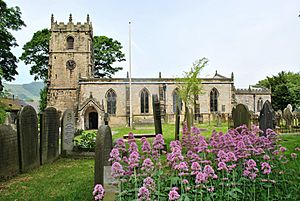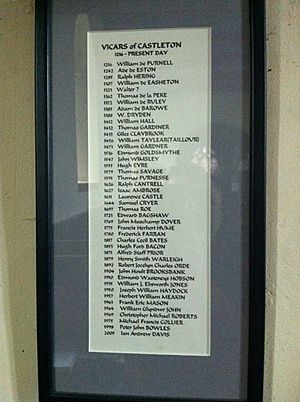St Edmund's Church, Castleton facts for kids
Quick facts for kids St Edmund's Church, Castleton |
|
|---|---|

St Edmund’s Church, Castleton
|
|
| 53°20′34.07″N 1°46′32.69″W / 53.3427972°N 1.7757472°W | |
| Location | Castleton, Derbyshire |
| Country | England |
| Denomination | Church of England |
| History | |
| Dedication | Edmund the Martyr |
| Architecture | |
| Heritage designation | Grade II* listed |
| Administration | |
| Parish | Castleton |
| Deanery | Bakewell and Eyam |
| Archdeaconry | Chesterfield |
| Diocese | Diocese of Derby |
St Edmund's Church is a historic parish church located in the village of Castleton, Derbyshire, England. It is part of the Church of England. The church is a Grade II* listed building, which means it is considered a particularly important building of more than special interest.
Contents
History of the Church
St Edmund's Church is very old, with some parts built in the 12th century. This means the church has been standing for over 800 years! Other sections were added in the 14th century.
Over the centuries, the church has been changed and updated. In 1831, a south porch was added, but the side aisles were removed. In 1886, a company called Hill Brothers of Tideswell carried out a major restoration to keep the building in good condition.
The Church Bells
The tower of St. Edmund's holds a set of eight bells. Six of these bells were made in 1802, and the two smallest bells, called trebles, were added in 1812. All the bells were created by a bell maker named James II Harrison.
These bells are special because they are quite light for their musical note. They are in the key of E-flat but weigh only about 11 hundredweight (around 558 kilograms). Usually, bells that ring in this key are much heavier, weighing around 20 hundredweight (over 1,000 kilograms).
Vicars of the Church
A vicar is a priest in charge of a parish church. St Edmund's has had many vicars since it was first built. The first recorded vicar was William de Furnell in the year 1216.
One well-known vicar was Isaac Ambrose, who served in the 1630s. The church keeps a list of all its vicars, showing a long line of people who have led the church community over hundreds of years.
Working with Other Churches
St Edmund's Church is part of a joint parish. This means it works closely with other nearby churches. These churches are:
The Church Organ
Inside the church, there is a large pipe organ made by the company Brindley and Foster. A pipe organ creates sound by forcing air through pipes of different sizes. For those interested in how it works, more details about this specific organ can be found on the National Pipe Organ Register.
Beautiful Stained Glass
The church has several beautiful stained glass windows that tell stories and honor people from the past.
See also
- Grade II* listed buildings in High Peak
- Listed buildings in Castleton, Derbyshire






